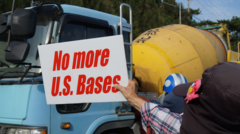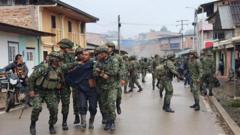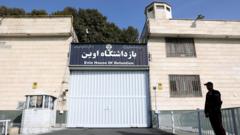A BBC exposé highlighting the killings of protesters by Kenya's security forces has ignited public outrage and demands for accountability. Human rights organizations are calling for criminal charges against identified officers and a broader inquiry into the violent suppression of recent demonstrations.
Calls for Accountability Rise in Wake of Kenya's Security Forces' Violent Protest Response

Calls for Accountability Rise in Wake of Kenya's Security Forces' Violent Protest Response
Renewed demands for thorough investigations into police and army actions during deadly protests are amplified after a revealing BBC documentary.
Kenya is currently facing heightened pressure for accountability following a BBC Africa Eye documentary that uncovered the brutal actions of security forces against protesters during anti-tax demonstrations in June 2024. The government is being urged to thoroughly investigate the killings of three demonstrators by security personnel, a revelation that has intensified public calls for justice.
Leading human rights organizations, including Amnesty International and the Kenya Human Rights Commission (KHRC), have demanded that the officers identified in the documentary be prosecuted. The investigation highlighted a tragic incident, where police and military personnel opened fire on unarmed protesters at the parliament, prompting widespread outcry across the nation.
The Kenyan government has yet to instigate significant action in response to the findings. While a spokesperson acknowledged the value of life, they criticized the BBC's documentary for perceived bias, asserting that it failed to present a balanced narrative of the events, including the vandalism that occurred during the protests. Isaac Mwaura, the government spokesman, stated that the media needs to accurately reflect the events to foster constructive discourse.
The issue was also raised in Kenya's parliament, where some MPs voiced concerns over the BBC’s portrayal of the situation, suggesting that it was driven by an external agenda. Conversely, other lawmakers urged a more rational approach to the protests' aftermath, warning against attempts to silence the media.
The Independent Policing Oversight Authority (IPOA) has indicated that they are on track with investigations but emphasized their independence in probing police conduct. The Kenyan Defence Forces stated that they had not received any referrals regarding alleged misconduct involving their personnel.
The fallout from the protests has been severe, with Amnesty International reporting a significant death toll and numerous cases of enforced disappearances linked to security operations. As public dissatisfaction grows, the rights groups are now advocating for a petition to be signed by citizens calling for a comprehensive inquiry into the events of June 25 and the broader implications of the government's fiscal policy.
Kenyan President William Ruto has refrained from acknowledging the allegations, having defended police actions amidst warnings against discussing military operations. The IPOA has reported ongoing investigations, yet no charges have been filed against any security officers thus far.
Following the BBC's findings, a poignant discussion around the need for transparency and accountability continues to unfold, raising questions about the responsibility of Kenyan leadership in the wake of rising discontent among citizens. As the nation wrestles with the implications of these brutal crackdowns, calls for a full investigation remain a focal point for advocates of justice and human rights in Kenya.



















